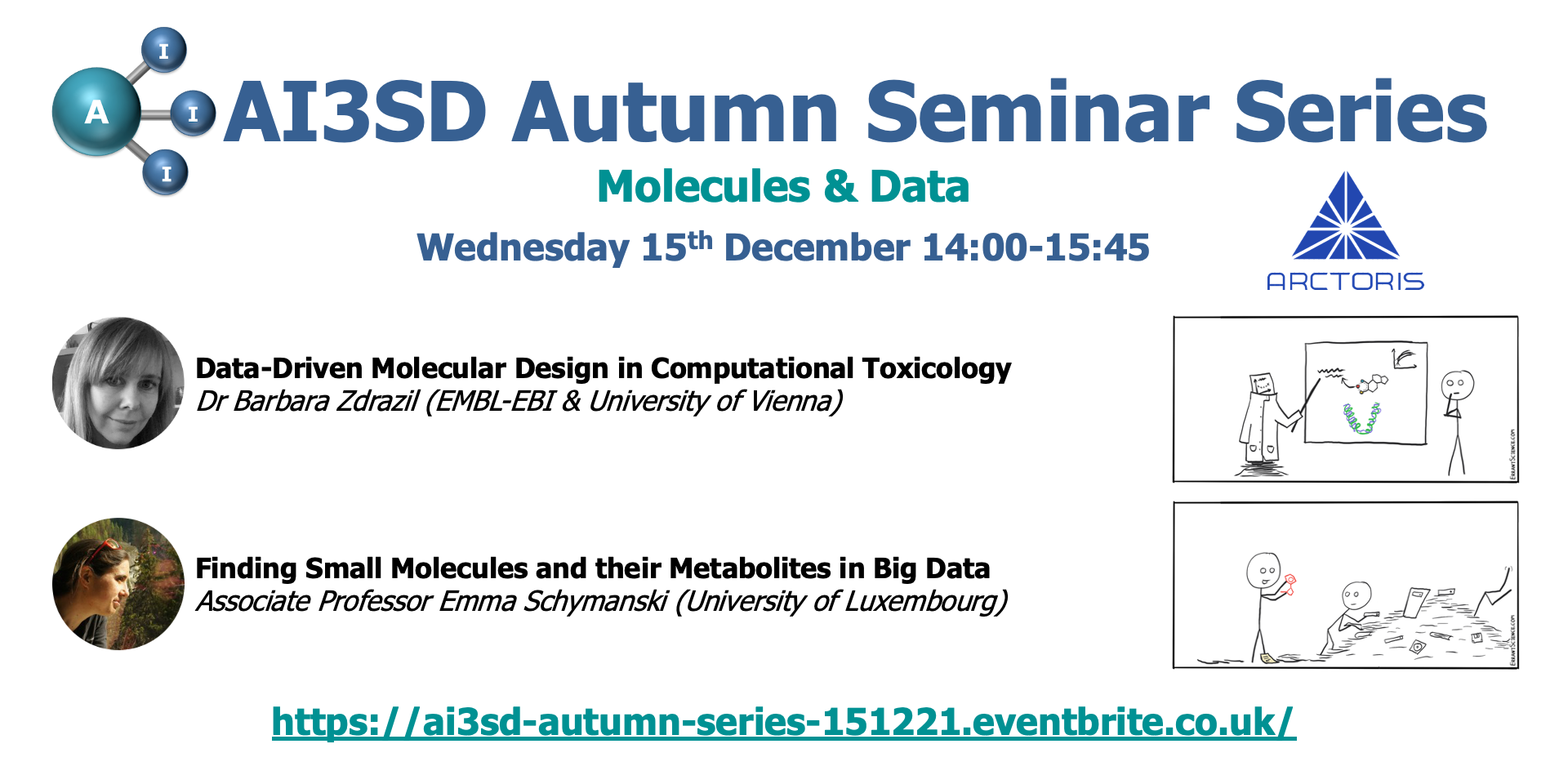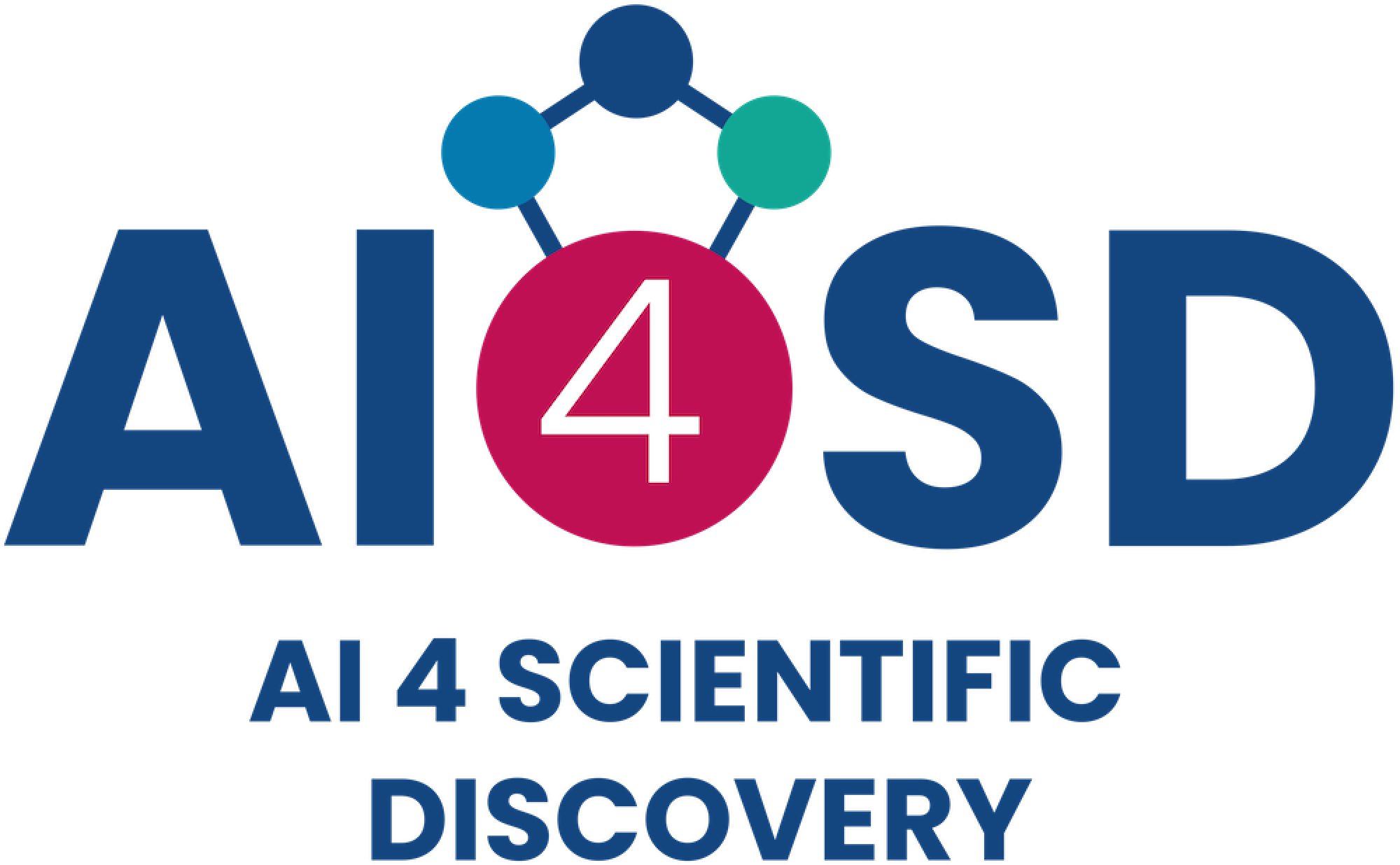
- This event has passed.
15/12/2021 – AI3SD Autumn Seminar X: Molecules & Data
15th December 2021 @ 2:00 pm - 3:45 pm
Free
Eventbrite Link: https://ai3sd-autumn-series-151221.eventbrite.co.uk/
Description:
This seminar forms part of the AI3SD Online Seminar Series that will run across the autumn (from October 2021 to December 2021). This seminar will be run via zoom, when you register on Eventbrite you will receive a zoom registration email alongside your standard Eventbrite registration email. Where speakers have given permission to be recorded, their talks will be made available on our AI3SD YouTube Channel. The theme for this seminar is Molecules & Data.
Agenda
- 14:00-14:45: Data-Driven Molecular Design in Computational Toxicology – Dr Barbara Zdrazil (EMBL-EBI & University of Vienna)
- 14:45-15:00: Coffee Break
- 15:00-15:45: Finding Small Molecules and their Metabolites in Big Data – Associate Professor Emma Schymanski (University of Luxembourg)
Abstracts & Speaker Bios
- Data-Driven Molecular Design in Computational Toxicology – Dr Barbara Zdrazil: Timely drug discovery and toxicology approaches have seen a rise in strategies which use data as a basis for decisions at various stages. Such approaches include (automated) data integration and curation efforts, predictive machine learning approaches, as well as structure-based molecular design strategies that make use of the wealth of publicly available data sources and data types. In this talk, various computational workflows which have been developed in my lab for addressing research questions related to toxicology will be presented. In one project, ligand- and structure-based methods have been combined in an effective data-driven manner to decipher the molecular basis of ligand recognition and selectivity for hepatic Organic Anion Transporting Polypeptides (OATPs). In the framework of this successful project, novel highly potent inhibitors of these SLC uptake transporters have been identified by an AI-driven virtual screening approach. At the other end of the spectrum, we are using target-agnostic information if the underlying mechanism of toxicity is insufficiently understood. Such approaches allow to leverage in vivo data for building predictive machine learning models but they also make the incorporation of in vitro bioactivity data possible. Another example will illustrate how data integration strategies can be used to consolidate Adverse Outcome Pathway (AOP) hypotheses, which are effective tools in toxicology and risk assessment to capture mechanistic knowledge of critical toxicological effects that span over different layers of biological organization.
Bio: Barbara Zdrazil is a group leader at the University of Vienna, and works as a safety data scientist for the European Bioinformatics Institute (EMBL-EBI). Barbara’s research is concentrated on integrating Data Science approaches into the Computational Molecular Design process. She focuses on off-targets (mainly hepatic uptake transporters of the SLC family), and develops automatized computational techniques to link heterogeneous data sources, perform bioactivity profiling, and generate predictive models – especially for toxicity predictions. In addition, Barbara is interested in large-scale data analyses including time trend analyses by utilizing public domain data. At EMBL-EBI, Barbara is contributing to Open Targets, a project which aims to enable systematic target identification and prioritization. Barbara received her PhD from the University of Vienna. During her PhD, Barbara mainly focused on ligand-based models for P-glycoprotein inhibitors. In her postdoctoral studies at the University of Düsseldorf she focused on structure-based modeling of DNA polymerase inhibitors. Barbara contributed to many EU-funded projects (including Open PHACTS and EU-ToxRisk) and was leading a nationally funded FWF project focusing on modeling of hepatic transporters from 2017-2021. In 2019, Barbara accomplished her Habilitation in Pharmacoinformatics at the University of Vienna. Since 2020, Barbara is also working as Associate Editor for the Journal of Cheminformatics. - Finding Small Molecules in Big Data – Associate Professor Emma Schymanski: The environment and the chemicals to which we are exposed is incredibly complex, with over 111 million chemicals in the largest open chemical databases, 300,000 estimated in global inventories of high use, and over 70,000 in household use alone. Detectable molecules in environmental samples, metabolomics and exposomics can now be captured using high resolution mass spectrometry (HRMS), which provides a “snapshot” of all chemicals present in a sample and allows for retrospective data analysis through digital archiving. However, there is no “one size fits all” analytical method, and scientists cannot yet identify most of the tens of thousands of features in each sample, let alone associate them with health or disease, leading to critical bottlenecks in identification and data interpretation. Defining the chemical space to search is a huge challenge, especially considering that chemicals transform in both organisms (metabolism) and the environment (both biotic and abiotic processes). This talk will cover European and worldwide community initiatives and resources to help find and identify small molecules and their metabolites (transformation products) – from compound databases to spectral libraries, from literature mining to transformation prediction. It will show how FAIR and Open interdisciplinary efforts and data sharing can facilitate research in many areas of small molecule research. Various contributors to this massive collaborative effort will be acknowledged throughout the talk.
Bio: Associate Professor Emma Schymanski is head of the Environmental Cheminformatics (ECI) group at the Luxembourg Centre for Systems Biomedicine (LCSB), University of Luxembourg. In 2018 she received a Luxembourg National Research Fund (FNR) ATTRACT Fellowship to establish her group in Luxembourg, following a 6 year postdoc at Eawag, the Swiss Federal Institute of Aquatic Science and Technology and a PhD at the Helmholtz Centre for Environmental Research (UFZ) in Leipzig, Germany. Before undertaking her PhD, she worked as a consulting environmental engineer in Perth, Australia. She has over 90 publications and a book, and is involved in many collaborative software efforts. Her research combines cheminformatics and computational (high resolution) mass spectrometry approaches to elucidate the unknowns in complex samples, primarily with non-target screening, and relating these to environmental causes of disease. An advocate for open science, she is involved in and organizes several European and worldwide activities to improve the exchange of data, information and ideas between scientists to push progress in this field, including NORMAN Network activities (e.g. NORMAN-SLE https://www.norman-network.com/nds/SLE/), MassBank (https://massbank.eu/MassBank/), MetFrag (https://msbi.ipb-halle.de/MetFrag/) and PubChemLite for Exposomics (https://doi.org/10.1186/s13321-021-00489-0).
